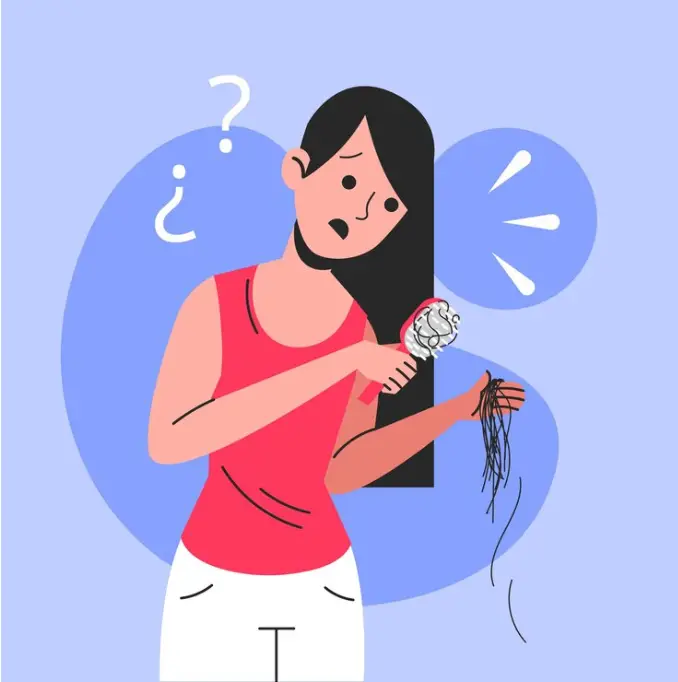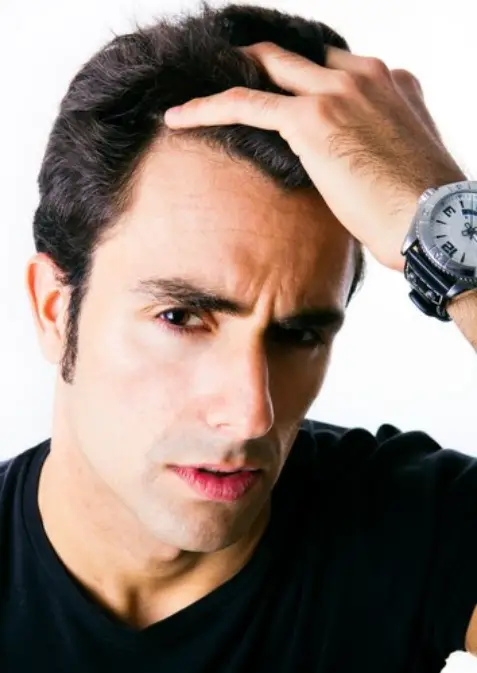
How to prevent teenage hair loss: a fact-based guide and solutions
Problem: Hair loss in teenagers – A growing concern
Adolescence is full of excitement and change, but a problem that poses a problem for many young people is hair loss. Although hair loss may seem like a phenomenon that happens later in life, the reality is that many young people experience it for other reasons. From dietary behavior to lifestyle choices and hormonal changes, teenage hair loss is becoming more and more common.
Understand the cause of hair loss in teenagers
Many factors contribute to hair loss during teenage life. To understand how to avoid it, it is essential to know its main causes. Here is a list of the most common reasons:
- Hormonal Imbalances Hormonal changes during puberty can cause significant changes in body chemistry. One of the most common causes of hair loss in young men is a fluctuation in androgen levels. Androgens, mainly dihydrotestosterone (DHT), can shrink hair follicles and shorten the hair growth cycle, leading to hair loss and hair loss.
- Dietary Deficiencies Teenagers regularly have irregular diets, which may also lack essential nutrients for hair growth. Iron, zinc, nutrients such as vitamin D and protein are essential to maintain healthy hair. A study carried out in 2020 showed that iron deficiency was one of the main causes of hair loss in young people, because iron helps in the production of hemoglobin, which helps in the conversion of oxygen into hair follicles.
- Stress Stress School, social life and personal problems often cause stress in teenagers, causing a situation called telogen effluvium. In this condition, the pressure forces the hair follicles to move towards the resting section, resulting in hair loss.
- Excessive use of styling products Teenagers often experiment with different styling techniques and products, such as gels, sprays, straighteners and curling irons. Excessive use can weaken the hair follicles and damage the scalp, leading to breakage and hair loss.
- Genetics Although genetics generally play a major role in hair loss later in life, hereditary factors can also cause hair loss in teenagers. If a child has experienced hair loss before, their children may face similar problems at a younger age.
- Medical conditions Conditions such as hypothyroidism, polycystic ovary syndrome (PCOS) and alopecia areata can contribute to hair loss. A 2018 study showed that teenagers with PCOS are more likely to experience hair loss due to high levels of androgens.
Anxiety: the emotional scale of hair loss
For many young people, hair is an important part of their identity. Hair loss during such a training period can affect self-confidence and self-esteem, causing emotional distress. The feeling of helplessness can be overwhelming, especially in the face of supposedly uncontrollable factors such as genetics or hormones.
Hair loss can make teenagers feel self-conscious in social situations. At school, with friends or even at family gatherings, teenagers with thin hair can feel different from their peers. According to a 2019 survey, almost 30% of teenagers who experienced hair loss reported feelings of isolation or anxiety about their appearance.
Social media also plays a role in amplifying this problem. Teenagers are constantly exposed to idealized images of beauty online, making them more aware of any changes in their appearance. This can cause an increased feeling of inadequacy or even melancholy. The consequences of hair loss are not only physical; they can influence intellectual well-being and a better average quality of life.
Solution: Practical steps to prevent teenage hair loss
Understanding that hair loss can be managed and often prevented with the right approach provides a sense of control. Here are some concrete steps teens can take to reduce or prevent hair loss:
1. Improve diet and nutrition
A balanced diet rich in essential vitamins and minerals is one of the most effective ways to prevent hair loss. Including the following in your daily meals can help:
🔵Iron: Found in spinach, lentils and lean meats, iron is essential for hair health. A 2017 study found that people with iron deficiency were more prone to hair loss. Teenagers, in particular, should be careful about their iron intake, especially during menstruation.
🔵Protein: Hair is made up of keratin, a protein. Eating foods like eggs, nuts and beans promotes hair growth and shape. Zinc and Biotin: Zinc promotes the growth and repair of hair tissue, while biotin (vitamin B7) improves keratin production. Both are found in nuts, seeds and eggs.
🔵Omega-3 fatty acids: Found in fish and flaxseeds, these fatty acids promote scalp health and reduce inflammation, which can contribute to hair loss.
By eating a balanced diet, teenagers can ensure that their bodies have the necessary vitamins for healthy hair growth
2. Manage stress effectively
Given the highly stressful environment that young people often find themselves in, stress management techniques are essential. Practicing mindfulness, yoga and breathing exercises can help reduce stress levels. Physical activities such as walking or swimming can also be used to relieve stress, promote general well-being and reduce hair loss.
A 2019 study showed that daily exercise helped change hormone levels and reduce cortisol (the stress hormone), which in turn reduced hair loss in teenagers. . Parents and schools can play a role in encouraging teens to engage in activities that help reduce stress.
3. Maintain good hair hygiene
Caring for your hair with the right practices can help prevent unnecessary hair loss:
🔵Avoid over-shampooing: Washing your hair too often can strip the scalp of its oils, leading to dryness and breakage. A mild shampoo 2 to 3 times a week is usually enough for most young adults.
🔵Use a wide-toothed comb: A wide-toothed comb helps prevent breakage when detangling wet hair. In addition, gentle hair washing can stimulate blood circulation in the scalp, thus promoting hair growth. Limit the use of hair dryers, flat irons and curling irons. These heating devices can weaken the hair over the years, causing it to break easily. When heat styling is essential, use heat protectant spray to protect hair from damage.
🔵Choose natural products: Many shampoos and conditioners contain harsh chemicals such as sulfates and parabens, which can damage the hair. Choosing natural products or natural products without these ingredients can promote healthier hair. Four. Avoid tight hair
🔵Many teenagers prefer tight hairstyles, including ponytails, buns or braids, but these can put excessive pressure on the hair follicles, leading to a condition called traction alopecia. This type of hair loss is caused by incessant pulling of the hair, which weakens the roots and can lead to permanent hair loss if not treated in time.
Encouraging teenagers to choose wider hair can help avoid this situation. It is also useful to avoid wearing the same hairstyle every day to give your hair a chance to regenerate.
4. Get regular medical checkups
Since some medical conditions can contribute to hair loss, it is essential that teenagers have regular checkups. If there is a family history of thyroid problems, PCOS or other clinical conditions associated with hair loss, early diagnosis can help treat the condition before it worsens. For example, hypothyroidism is a common cause of hair loss, and a simple blood test can detect it. A 2021 study recommended early screening in young adults, especially women, who experience symptoms such as sudden hair loss, fatigue and weight gain.
5.Consider natural remedies
Natural remedies, although not scientifically proven in all cases, can provide relief to some people. Some popular options include:
🔵Aloe Vera: Known for its soothing properties, aloe vera can help reduce scalp irritation and promote hair growth. Applying aloe vera gel directly to the scalp several times a week can help soothe the infection and promote a more conducive environment for hair growth.
🔵Coconut Oil: Rich in lauric acid, coconut oil penetrates the hair shaft and helps reduce protein loss. Massaging the scalp with coconut oil before washing can help improve hair growth and prevent breakage.
🔵Onion juice: Although its smell may be unpleasant, onion juice has been studied for its ability to stimulate hair growth. A 2014 study found that applying onion juice to the scalp twice a day promotes hair growth in people with alopecia areata.
Final Thoughts: Consistency is key
Teenage hair loss is often reversible with the right approach. However, it is important to note that the results. It will not appear overnight. It is essential to follow a healthy diet, reduce stress and follow the right exercises for hair care. Encouraging teenagers to adopt these practices can not only prevent hair loss, but also promote healthy and strong hair in the long run.
Many factors that cause hair loss are controllable, but it is essential to treat the problem early. If the situation worsens despite preventive measures, consulting a dermatologist or doctor should be the next step. Hair loss can be a temporary setback in a teenager’s life and with the right guidance and attitude, it can be effectively controlled.

